Egg White Protein 101: Benefits & How to Use
Author:
Unlock your full potential by engaging with our experts and community! Have questions about your fitness journey or looking for expert advice on weightlifting techniques? Don’t hesitate — leave a comment below and Oleksandr Maksymenko will provide a personalized answer and insights to help you reach your goals.
Torokhtiy is reader-supported. Some links are affiliate links, and we may earn a commission at no extra cost to you. See our disclosure page for details.
Protein shakes are one of the most frequently used supplements in the fitness industry. In fact, a 2020 survey study suggested that up to 80.1% of gym users may consume a protein supplement in western influenced countries.
Many consumers opt to use egg based protein powder over the traditional whey for a variety of reasons. A common one being that eggs are among the highest quality protein sources, yet are free from lactose, which many are sensitive to, as we have highlighted later.
If you fall within this bracket and are considering using an egg based protein powder, you have stumbled across the perfect article. We’ll let you know all about its benefits and we’ll tell you how to use it to get the most out of it.
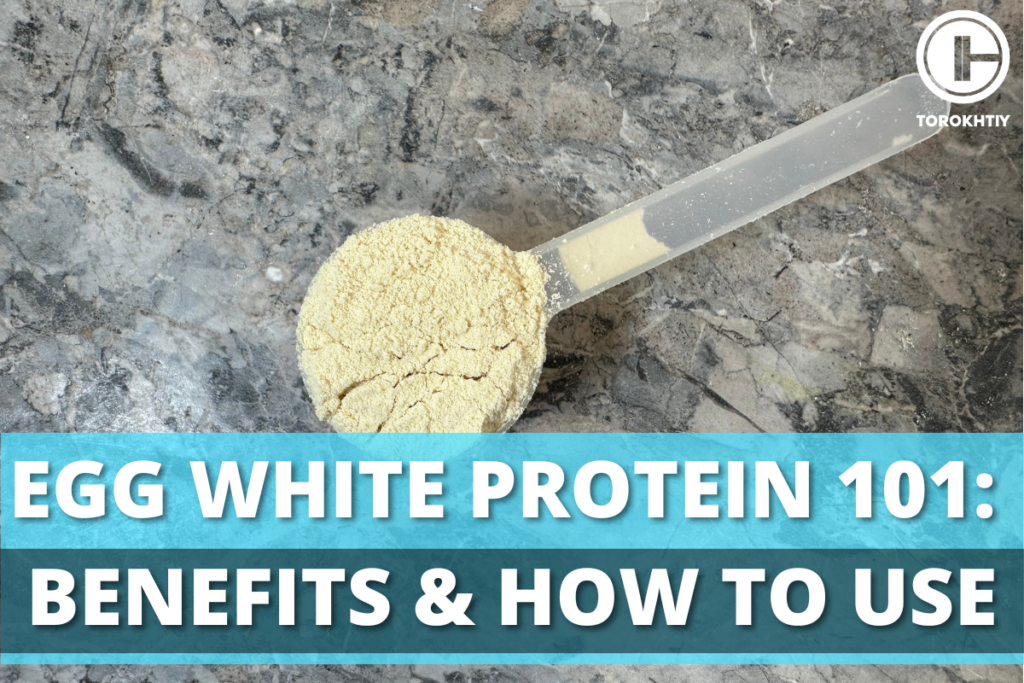
What Is Egg White Protein and How Is It Produced?
As the name suggests, egg white protein is the white portion of whole eggs. In order to form an egg white protein powder, the liquid egg whites are extracted from whole eggs, then filtered to eliminate any impurities.
Following this procedure, the liquid egg whites are inserted into a hot chamber where they are spray-dried to remove the moisture. This process leaves behind a dry egg white protein powder that is packaged and distributed around the world to be sold.
Some egg white protein powders are flavored using natural and/or artificial sweeteners, thereby may contain some additional calories.
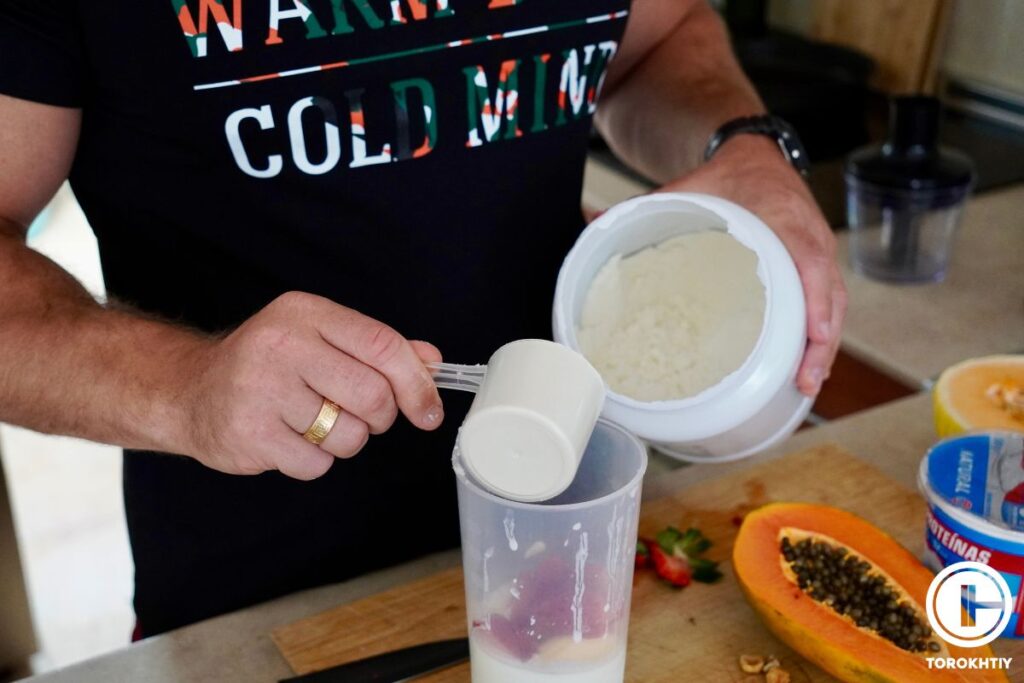
What Are 4 Benefits of Egg Protein?
There are a variety of sweeteners used in chocolate proteins, but we’ll be breaking down the main types used for the products on our list.
✅ Stimulates Muscle Protein Synthesis
Egg based protein powder is one of the most bioavailable protein sources, therefore is a great supplement for muscle building. Not to mention, it is high in amino acids, specifically leucine.
Before we get into the relevance of leucine, it is important to mention that egg white protein consists of ~9%, which may rank it within best protein sources for short term muscle protein synthesis, comparable in quality to whey protein.
Leucine is one of three branched chain amino acids, which stimulates muscle protein synthesis. The amount of leucine needed to maximize muscle protein synthesis varies from person to person.
As egg whites are high in leucine, they may be more effective for muscle building compared to say non animal based protein sources like wheat or soy.
This is not to discredit non animal protein sources, as the same level of muscle protein synthesis/muscle building may still be achieved, but at the cost of choosing protein sources more carefully and mixing different proteins.

✅ Great Supplement for Weight Management
Generally, most egg white protein powders are isolated, so it has a very minute amount of dietary fats and carbohydrates, if any. This makes egg white protein powder a lean and low calorie protein option.
This is great to manage or reduce weight. Why so? It can provide all of the muscle recovery benefits, yet support a lower calorie diet to drop bodyweight.
✅ Suitable for Those Who Are Lactose Intolerant
Lactose intolerance is a digestive disorder, where the body is unable to digest lactose, which is found in dairy products like milk, or even protein powders like whey and casein. Side effects of consuming lactose for such individuals include bloating, diarrhea, constipation, excessive gas, and feeling sick.
As egg protein powders are free from lactose, Individuals who experience lactose intolerance may be able to reap muscle growth and recovery benefits of protein powder without the side effects.
✅ Micronutrient Dense
Egg white protein powder is micronutrient and mineral dense, rich in vitamin B1 & B12 (and other B vitamins), selenium, and riboflavin. This will reduce the risk of certain micronutrient deficiencies needed to stay healthy.
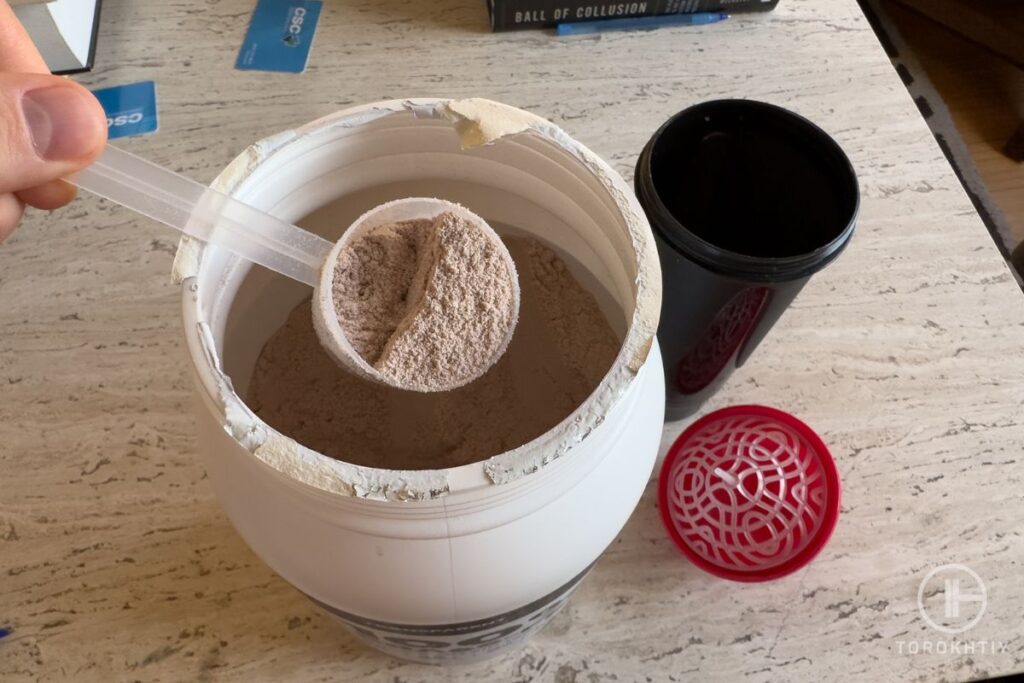
What Are 3 Disadvantages of Egg Protein?
❌ Egg Allergies
The immune system of some individuals may overreact to the egg based products, thereby releasing chemicals like histamine. Such individuals may then experience an allergic reaction and break out into skin conditions like rashes, hives and swelling.
More severe allergic reactions could include breathing difficulties and anaphylaxis. If you are allergic to eggs, then this type of protein powder is definitely not for you.
❌ Price Point
Although the price point of protein powders varies from brand to brand, egg protein powder is typically more expensive than other variants like whey. The reason behind this is, egg protein powders are not as widely available and are not as easy to manufacture.
To further elaborate, The production of egg protein powder requires a thorough process of separating the yolk, filtration and air drying. These processes require high-end machinery and are labor-intensive, which all comes at a cost, thus affecting the retail price.
❌ Specific Taste
Generally, egg protein is not known for taste, in fact most egg based proteins are unflavoured.If you prefer the texture and taste of milkshake, egg protein may not appeal to you.
This may be a disadvantage if taste/flavor is important and you cannot take other more flavorful types of protein powder for whatever reason.
Egg vs Whey Protein
We have compared egg and whey below using 4 different criteria.
1. For Lactose Intolerance
Clearly egg protein powders are the better option for those who are intolerant to lactose found in dairy products like whey. Of course, there are lactose-free or zero-carb whey options, but some people with lactose intolerance react negatively even to these.
They may also have an intolerance to cow’s milk proteins, so even lactose-free dairy options continue to cause trouble.
2. Effectiveness for Muscle Protein Synthesis
Let’s say right away that a single protein shake has very little effect on muscle protein synthesis. It’s more a question of the whole diet and sufficient protein intake from different sources.
Research into whether it is possible to increase protein synthesis through increased consumption of certain amino acids is still ongoing. As we already mentioned, leucine has such potential.
It appears that whey protein has a higher concentration of leucine. Whey contains 11% leucine, whereas egg protein contains 9%. To get the 3g leucine threshold, you would need 25g of protein from whey or 35g of protein from egg.
Does it make a difference in real life? Hardly significant.
3. Cost
As we have mentioned, whey is much cheaper than egg protein. A 2lb tub of whey would cost $20-$40 which yields around 20-30 servings. An egg protein powder would cost around $30-50 for the same size tub and servings.
4. Taste
This is entirely subjective and will depend on the brand. Many prefer whey protein powder for its milder taste, mixability and texture. However, others may prefer the unique taste of egg white protein powder.
It is worth noting that protein powder can be used not only for shakes, but also for cooking. In this case, the neutral flavor of the egg powder may be preferable for some recipes.
| Protein Type | Price range 2lb tub | Lactose content | Allergies | Protein Quality | Taste |
|---|---|---|---|---|---|
| Egg protein | $20-$40 | No | Common allergen | Complete protein (less leucine), slower-digesting | Neutral, limited flavors |
| Whey protein | $30-50 | Yes / lactose-free options available | Common allergen | Complete protein, fast-digesting | Milkshake, wide variety of flavors |
What Is the Best Way to Use Egg White Protein?
A Flavored egg protein can simply be mixed with 12 oz of water or beverage of choice. However, there are other options, especially for unflavoured egg protein powder. If you intend to use egg white protein powder in omelets, pancakes, or bakes, you could mix it with batter, eggs or other dry ingredients.
For example, you could replace ⅓ of the baking flour with egg white protein. This would reduce the carbohydrate content and Increase lean protein.

How to Find the Best Egg White Protein Powder?
1. Protein Content
Generally, we would suggest looking for an egg white protein powder consisting of ~70-80% protein which would equate to around 20-25g of protein per serving.
2. Price
A high-quality egg protein priced ~$2 or under per serving would be a reasonable price. You could justify paying 20-30 cents over if the product has been batch tested by “informed sports” (if you compete in drug tested sports) or it comes flavored with ingredients that improve the mixability and texture.
3. Authenticity & Safety of the Product
To make sure the ingredients are authentic you may consider a product that has been 3rd party tested. Similarly, if you compare in drug tested sports, a product that has been batch tested by “informed sports” would be the safest option.
Naked Nutrition Egg White Protein Powder
- Best for: Building Muscle, Improving Recovery, Cutting
- Suitable for Vegans: No
- Protein Source: Non-GMO chicken eggs made in the USA\
- Serving Size: 31g (2 scoops)
- Price per Serving: ~$1.23
- Protein-by-Weight Ratio (%): 80.6%
- Proteins: 25g
- Carbohydrates: 2g
- Fat: 0g
- Added Sugar: 0g
- Company Founded: 2014
- Recommended by Athletes: JJ Watt, Chris Paul, Megan Rapinoe
Within a 31g serving of the Naked Nutrition Egg White Protein Powder there is 25g of protein, 2 of carbohydrates and no fat. It is also 3rd party tested which supports its authenticity. The egg white are lactose, gluten, GMO, and soy free, as well Keto friendly making it very transparent.
We could consider this the best egg protein powder as it has one of the highest percentages of protein per container, yet at the lowest price point when compared to other competitors products.
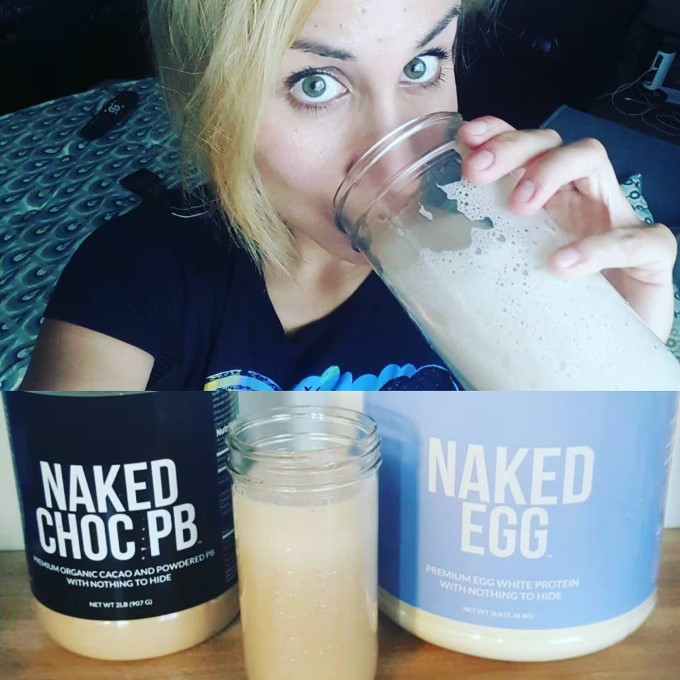
Naked nutrition has included a small amount of sunflower lecithin, which may improve the solubility of the egg white protein.
The Naked nutrition egg white protein cost ~$1.23 per serving, which contains over 80% protein. We can safely say that this is amongst the best egg proteins, in terms of value for money.
FAQ
Is Egg White Powder High In Protein?
YES! Egg white protein powders contain around 20-24g of protein per serving
Is Egg White Protein As Effective As Whey?
Despite some difference in amino acid composition and possible benefits for muscle growth of whey protein, when it comes to supplementing a balanced diet with protein, there is no significant difference. The important thing is the total daily protein intake from mixed sources.
Conclusion
Egg white protein powder is highly beneficial and versatile. It’s a great supplement for anyone who wants to increase the amount of protein they take, and its high-quality protein content combined with low fat and carbohydrate levels makes it ideal for people who have different dietary goals – whether that’s building muscle, losing weight, or just keeping their diet balanced.
Of course, that’s only if you pick one that’s good quality. You’re more than welcome to do your own research, but if you want to skip that, go ahead and give the Naked Nutrition Egg White Protein Powder. We promise you won’t be disappointed!
Thank you for reading, please do not hesitate to leave a comment, question or query and we will get back to you as soon as possible.
Also read:
- Best Protein Powder Without Heavy Metals
- How Long Do Protein Shakes Last
- What Is Grass Fed Whey Protein
- Protein Powder And Lactose Intolerance
- Whey Isolate Protein Guide
- Ke-Forma Protein Review
- Is Sugar Free Protein Powder Better
- How To Make Protein Shakes Taste Better
References:
- Prevalence of dietary supplement use by gym members in Portugal and associated factors //Biomedcentral: https://jissn.biomedcentral.com /articles/10.1186/s12970-020-00342-z.
- Lactose intolerance //NHS: https://www.nhs.uk/conditions /lactose-intolerance/.
- Egg white drying: Influence of industrial processing steps on protein structure and functionalities //Sciencedirect: https://www.sciencedirect.com/ science/article/abs/ pii/S0260877407002087.
- Effects of Amino Acids and their Metabolites on Aerobic and Anaerobic Sports //LWW: https://journals.lww.com/nsca-scj/Fulltext/2012/ 08000/Effects_of_ Amino_Acids_and_ their_Metabolites _on.8.aspx.
- Leucine supplementation and intensive training //NIH: https://pubmed.ncbi.nlm.nih.gov /10418071/.
- Food allergy //Nhsinform: https://www.nhsinform.scot/ illnesses-and-conditions/nutritional/food-allergy.
- Photos made by Torokhtiy Media team.
Why Trust Us?
With over 20 years in Olympic weightlifting, strength training, nutrition coaching, and general fitness our team does its best to provide the audience with ultimate support and meet the needs and requirements of advanced athletes and professional lifters, as well as people who strive to open new opportunities and develop their physical capabilities with us.
By trusting the recommendations of our certified experts in coaching, nutrition, and sports training programming, as well as scientific consultants, and physiotherapists, we provide you with thorough, well-considered, and scientifically proven content. All the information given in the articles concerning workout programming, separate exercises, and athletic performance, in general, is based on verified data.
The product testing process is described in more detail here.
Author: Oleksandr Maksymenko
Certified Sports Nutritionist,
MSc Sports Dietetics
Specializing in: Weight management, Fitness / Sports nutrition
Oleksandr is a professional fitness nutritionist certified by the Fitness Professional Association (FPA). He follows the principles of evidence-based dietetics and fosters a healthy relationship with food in his clients, ensuring there are no strict prohibitions on their favorite foods or frequent lapses. His primary goal is not only to achieve results for you but also to sustain them over the long term, all while enjoying tasty and delicious food.



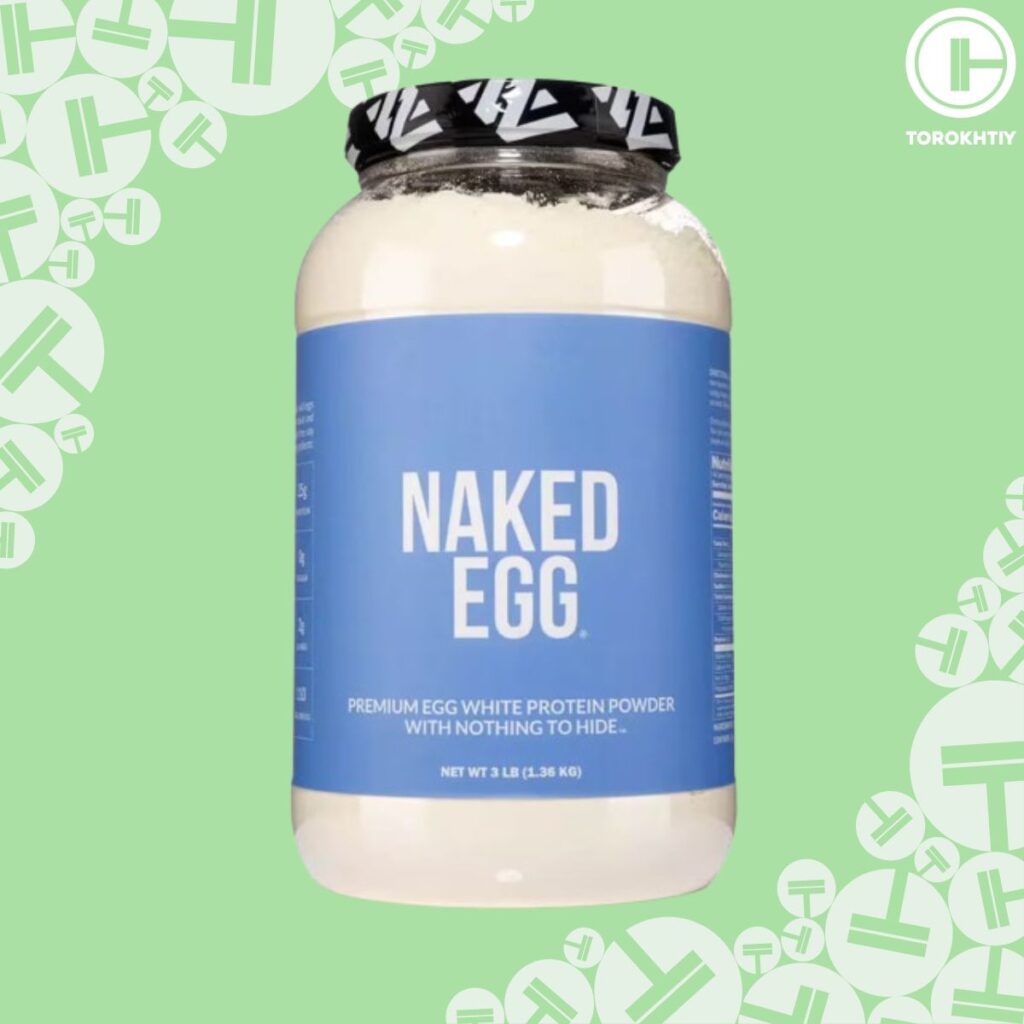
Still have questions after reading our article? Unlock your full potential by engaging with our experts and community! Don’t hesitate — leave a comment below and Oleksandr Maksymenko will provide a personalized answer and insights to help you reach your goals.